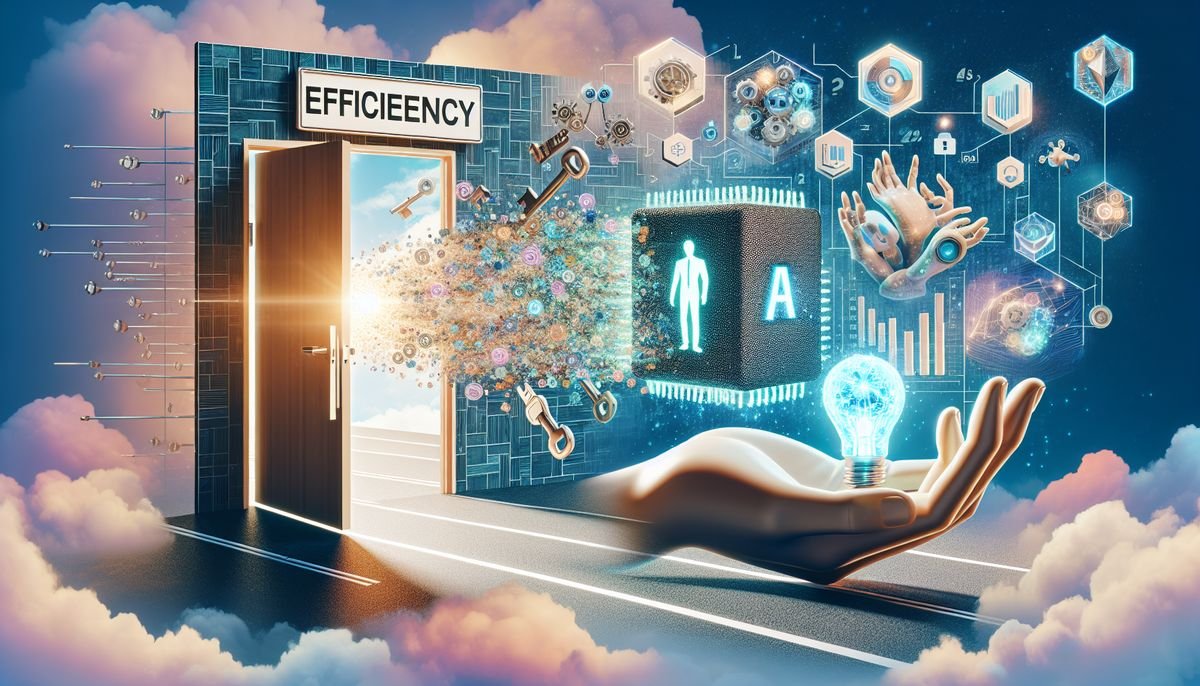As we delve into the transformative world of Generative AI, it’s clear that its impact on business innovation cannot be overstated. With the power to revolutionize market research and enhance creativity, Generative AI is a pivotal tool in the modern business landscape. By understanding its potential and integrating it effectively, businesses can unlock new levels of efficiency and innovation. This article explores the ways in which Generative AI is shaping the future of business, focusing on market research and the amplification of human creativity and innovation.
Key Takeaways
- Generative AI offers unparalleled insights in market research, providing businesses with a competitive edge through enhanced data analysis and customer understanding.
- The synergy between Generative AI and human ingenuity is empowering businesses to elevate creativity, optimize sales strategies, and drive innovation.
- While integrating Generative AI poses certain challenges, its long-term benefits include cost savings, increased accuracy, and improved decision-making capabilities.
Revolutionizing Market Research with Generative AI
Understanding the Impact of Generative AI on Market Insights
The integration of Generative AI into market research has been a game-changer for businesses seeking to understand and anticipate market trends. One of the key advantages of Market Research using Generative AI is its ability to uncover hidden insights and discover new opportunities. It has transformed the landscape of market analysis by providing a level of depth and speed previously unattainable with traditional methods.
Generative AI technology has revolutionized market research by automating various tasks such as data collection, data analysis, and report generation. This automation leads to faster, high-quality insight generation, allowing market researchers to gain efficiencies when it comes to understanding their consumers. The technology can analyze massive datasets from diverse sources, including social media, customer feedback, surveys, and industry trends, to extract meaningful patterns and trends.
By identifying correlations, sentiment analysis, and customer preferences, Generative AI enables businesses to gain a comprehensive understanding of market dynamics and customer behavior.
The following points highlight the transformative role of Generative AI in market research:
- Automating Market Research with AI: Unlocking Insights Faster
- Uncovering Hidden Opportunities: AI’s Impact on Market Insights
- Predictive Analysis Made Easy: Harnessing AI for Market Research
- Driving Business Growth with Generative AI in Market Research: Role of Lead AI Strategist
- From Data to Decisions: AI’s Journey
- Synthetic Respondents Transforming Surveys
- Transforming Surveys: The Power of Generative AI
- Uncovering Hidden Insights: Synthetic Respondents in Market Research
Strategies for Implementing Generative AI in Market Analysis
As businesses seek to stay competitive in a rapidly evolving marketplace, the implementation of Generative AI in market analysis has become a strategic imperative. Generative AI is transforming marketing work today, from content creation to strategy development, lead generation to campaign analysis. To harness its full potential, companies must adopt a structured approach:
- Identify specific market research goals: Determine what insights are needed and how Generative AI can address them.
- Integrate diverse data sources: Leverage AI to analyze data from social media, customer feedback, and industry trends.
- Invest in the right tools and expertise: Select AI technologies that align with business needs and invest in training.
- Iterate and refine: Use AI-generated insights to inform strategies and continuously improve processes.
Generative AI not only augments traditional methods but also revolutionizes them, promising to change market landscapes irrevocably.
By following these steps, businesses can unlock new opportunities and gain a deeper understanding of market dynamics. The ability to conduct predictive analysis and scenario modeling with Generative AI provides valuable foresight, enabling companies to mitigate risks and proactively seize market opportunities.
Case Studies: Successful Market Research with Generative AI
In recent months, the application of Generative AI in market research has demonstrated significant strides in efficiency and depth of insight. Businesses are now leveraging these advanced tools to gain a competitive edge, transforming the landscape of market analysis. For instance, SIS International Research has been at the forefront, studying the development and applications of Generative AI, focusing on market dynamics, technological advancements, and infrastructure requirements.
One notable example is the work by scientists at Google DeepMind, who have utilized Generative AI to streamline the process of scouring scientific literature for data. This has proven to be a game-changer for researchers, saving countless hours and accelerating the pace of discovery.
The integration of Generative AI into market research not only enhances the speed of data analysis but also uncovers patterns and trends that might otherwise remain hidden. This represents a paradigm shift in how market intelligence is gathered and utilized.
The following list highlights some of the transformative impacts of Generative AI in market research:
- Transforming Surveys: The Power of Generative AI
- Uncovering Hidden Insights: Synthetic Respondents in Market Research
- Optimizing Decision-Making through Generative AI Surveys
- Staying Ahead of the Competition with Synthetic Respondents
By embracing these innovations, businesses can optimize their market research efforts, ensuring they remain at the cutting edge of their respective industries.
Enhancing Creativity and Innovation in Business with Generative AI
The Synergy of Generative AI and Human Ingenuity
The recent surge in Generative AI technologies has sparked a renaissance in the way businesses approach creativity and innovation. At the forefront of this movement, companies like Google and Amazon are redefining customer engagement by transforming interactions into actionable insights, while Microsoft and Synthesia are pioneering in data-driven solutions and content creation, respectively.
- Google: Refining customer engagement through AI-driven insights
- Amazon: Crafting strategies with AI to uncover new opportunities
- Microsoft: Innovating with AI for transformative data solutions
- Synthesia: Reshaping content creation with generative AI
Generative AI is not just a tool for automating processes but a collaborative partner that enhances human potential. It empowers individuals to transcend traditional boundaries of creativity, enabling them to explore innovative ideas irrespective of their prior originality. This synergy is crucial for businesses that aim to stand out in a competitive market. Brands that rely solely on AI risk losing their unique voice, as generative AI should complement, not replace, human creativity.
The integration of generative AI into business practices is a delicate balance that requires a thoughtful approach to maintain the essence of human ingenuity.
As we move into uncharted territories of job roles and skills, it’s clear that generative AI will play a pivotal role in shaping the future of work. The potential for AI to revolutionize industries such as entertainment, advertising, and design is immense, with new forms of artistic expression and innovation on the horizon.
Generative AI as a Tool for Empowering Sales and Marketing
In the dynamic world of sales and marketing, Generative AI is becoming an indispensable ally. By automating routine tasks, it allows sales teams to focus on more strategic activities, such as closing deals and nurturing customer relationships. A recent trend in the application of Generative AI is its role in enhancing customer experiences (CX) and engagement. By analyzing vast datasets, including social media and customer feedback, Generative AI identifies patterns and preferences that can be used to tailor marketing strategies and personalize customer interactions.
One of the most compelling applications of Generative AI in sales is its ability to assist during sales calls. With appropriate customer consent, AI models can generate summaries of conversations and suggest actionable follow-ups, which are seamlessly integrated into CRM systems. This not only improves the efficiency of sales representatives but also ensures a more personalized customer journey.
The integration of Generative AI into sales and marketing processes is not just about efficiency; it’s about creating a more engaging and personalized experience for customers.
As businesses continue to explore the potential of Generative AI, it’s clear that its impact on sales and marketing is profound. The technology not only streamlines operations but also opens up new avenues for innovation and customer connection.
Navigating the Challenges of Integrating Generative AI into Creative Processes
As businesses strive to integrate Generative AI into their creative workflows, they encounter a range of challenges that require both technical and cultural shifts within the organization. The adaptation of Generative AI demands a nuanced understanding of its capabilities and limitations.
One of the recent topics of interest is the development of Generative AI tools that are inclusive and accessible to people with disabilities. This initiative not only broadens the user base but also ensures that the benefits of AI-driven creativity are shared equitably.
Embracing volatility and maintaining flexibility in adapting to changing capabilities will be essential for sustaining the arc of business value over time.
Here are four key risks identified in recent discussions around Generative AI:
- Disorientation and concern among leaders about the new technology.
- The need for continuous technical updates and cultural shifts within organizations.
- Ensuring trust and inclusivity in the design and use of Generative AI.
- The challenge of moving from proof of concept to production-ready applications.
Addressing these challenges involves a strategic approach that includes ongoing education, technical reviews, and fostering a culture of innovation that is open to exploring uncharted territories of job and skills requirements.
Conclusion
As we have explored throughout this article, Generative AI is not just a technological novelty but a transformative force in the business world. Its applications span across various sectors, enhancing creativity, efficiency, and decision-making. While the implementation of Generative AI may require an initial investment and a certain level of expertise, the long-term benefits are clear. From revolutionizing market research to empowering sales enablement and augmenting human ingenuity, Generative AI provides businesses with the tools to innovate and stay competitive in a rapidly evolving digital landscape. As we continue to witness the growth and impact of Generative AI, it is imperative for businesses to embrace this technology, leverage their unique data, and unlock new levels of efficiency and innovation.
Frequently Asked Questions
What are the potential benefits of using Generative AI in market research?
Generative AI can significantly enhance market research by providing deep insights through data analysis, predicting consumer trends, personalizing customer experiences, and reducing the time and cost associated with traditional market research methods.
How can businesses integrate Generative AI into their creative processes?
Businesses can integrate Generative AI into creative processes by using AI-powered tools for content creation, design, and idea generation, training AI with proprietary data to tailor outputs, and collaborating between human and AI to leverage the strengths of both.
What challenges might a business face when adopting Generative AI technology?
Challenges may include the initial investment and expertise required for implementation, ensuring data quality and privacy, managing the ethical considerations of AI-generated content, and integrating AI into existing workflows without disrupting human roles.



